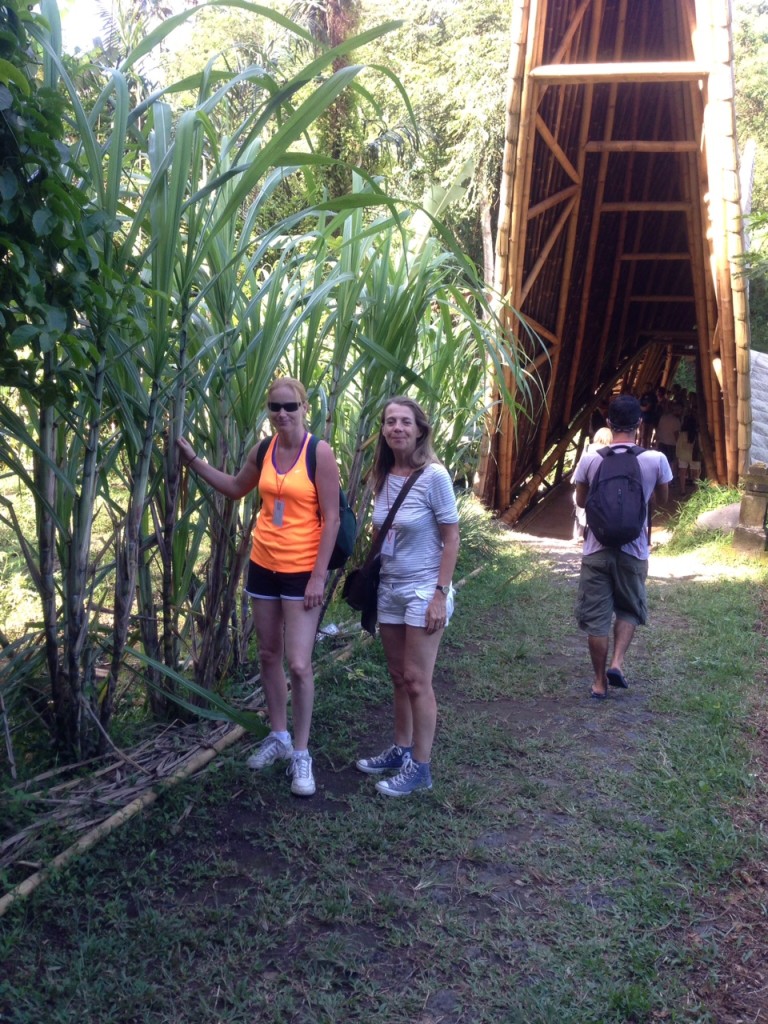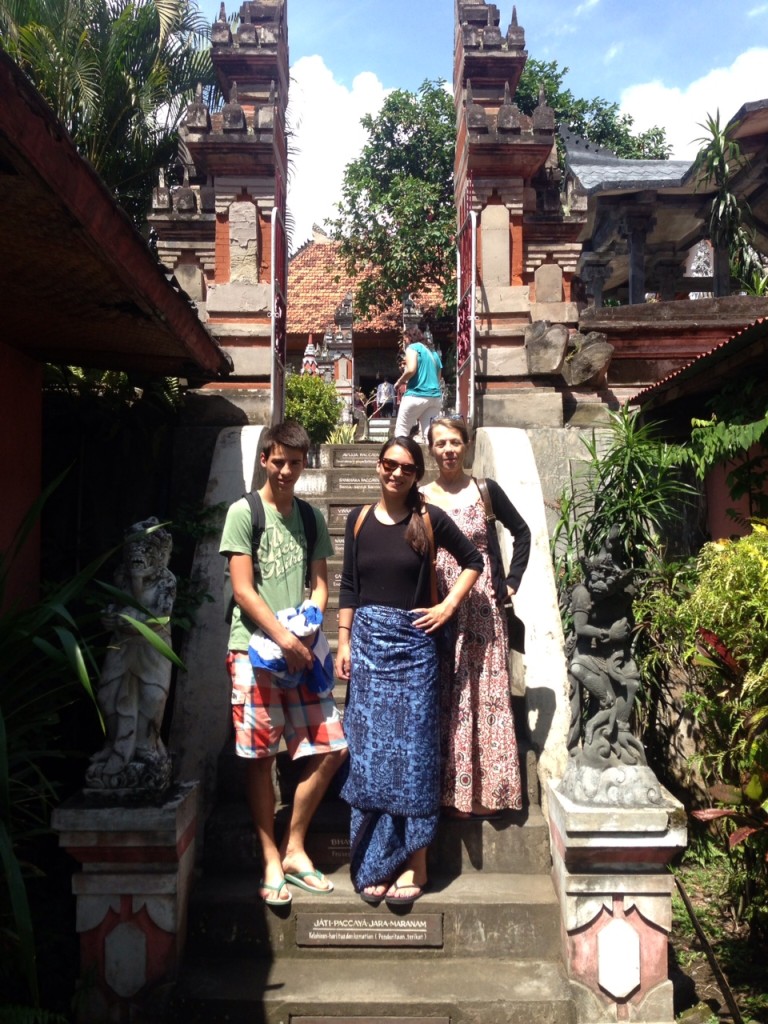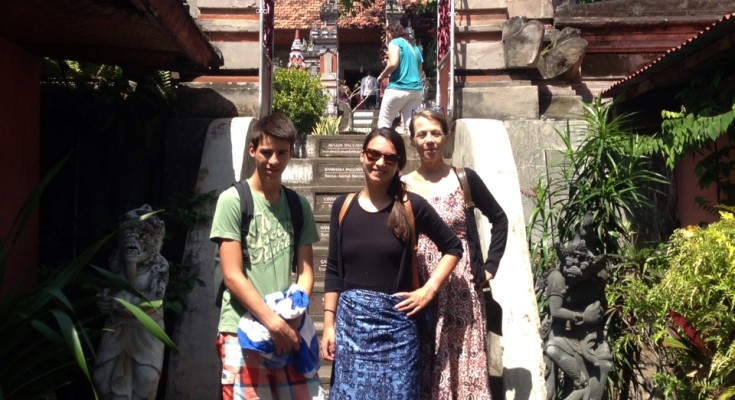|
At the Ulu Watu temple on the southern Bukit peninsula, hundreds of tourists gather each day at dusk to watch the setting sun gild the temple and the sheer cliffs on which it stands with color. According to Balinese mythology, this stunning sacred place once launched a sakti priest, one with supernatural powers. The 15th century Ide Pedanda Sakti attained the ultimate spiritual liberation or moksha, the conscious ascension to the heavenly sphere, at Ulu Watu. The temple now attracts millions of visitors a year, most with more earthly ambitions. The caretakers of the temple are often approached by awestruck tourists who explain that they love Bali so much they want to buy a piece of it and build a vacation home. Curious about real estate values, they ask, “Who owns that temple?”
At Pengrebongan temple in Kesiman, Bali, a harried Balinese tour guide shepherded a group of rowdy tourist teenagers in to watch a temple anniversary ceremony. Having imbibed a little too much of the local spirits earlier that evening, a few of these guests were tempted to behave badly. Not content with the mere consumption of culture, they started up their own version of the sacred kris dance—a tuak-inspired slamdance—disrupting the Balinese as they wove back and forth wielding their ceremonial blades. One of the village priests motioned for help in locating the tour guide in charge of the unruly headbangers. Wayan Kobar, the guide, hit by a fit of ritual overload, had escaped the scene and was gambling in the alley behind the temple. The priest, exhausted by the search for the wayward Wayan, finally called out in Balinese, “Sire nruwen touris nike?”—“Who owns these tourists?”

The Western tourist to Bali—like it or not—takes on a vast variety of roles. They are the tamu or “guests” who crowd Bali’s hotels and restaurants and fill its cash registers with foreign currency. They are the bule, those pale-skinned people who puzzle Balinese by spending much of their time baking in the sun like suckling pigs being roasted for a ritual. They are—in the language of bureaucrats—“agents of globalization,” bringing new ideas, new morals, new music and used T-shirts to the youth of Bali. They are witnesses, come to wonder at the pageantry of local art and ceremony, proving to Balinese conservatives that their culture can compete with anyone else’s. They are neighbors and friends and lovers and spouses and in-laws and business partners and teachers and employers. And last—but hardly least—they are not only buyers of Bali but commodities themselves.
Some Westerners in Bali may take offense at this last statement. Long-term expats, culture vultures, sensitive students and the “I Know Bali Better Than You” crew may complain that they’re different, that their relationships with Bali and the Balinese are real and honest, transcending the crass commercialism of the tourist trade. That may well be so. But it makes no difference when it comes to commission.
In Bali, most transactions involving Westerners are commissionable. Hotels, restaurants, galleries, artshops, day tours, car rentals, souvenir sellers—all pay Balinese to bring them customers. Sometimes the slice is small—5 to 15 percent. And sometimes it’s huge—up to 50 percent of the bill. On the “silver strip” in the village of Celuk near Ubud, where kilometers of roads are crowded with jewelry stores, the commodification of tourists is even more blatant. Here tourists are bought “by the head,” with every tourist who enters, no matter if they buy or not, netting their guide bonus—called, in local slang, a dis for you. It doesn’t matter much if the Westerner is husband, wife, partner or friend, the envelope is often ready and waiting whether the Balinese companion requests it or not.
In one way, the practice of commission is based on modern stereotypes of Western difference, on the belief that all tourists—meaning all Westerners—stand outside the borders of Balinese culture, holding thick wallets stuffed with dollars. But in another way, commission is as Balinese as babi guling. Everybody pays it and everybody gets it, whether it’s for helping to sell a piece of land or a motorbike, arranging a passport or a driver’s license, or finding someone laborers or tenants. These payments are called by a variety of euphemisms, including uang dengar (“listening money”), uang rokok (“cigarette money”) and uang pelicin (“smoothing money”). To be sure, this practice has been helped along by contemporary state corruption, but the government didn’t start it. Balinese cockfighters have long given the man who ties the knives to their birds’ legs a share of their winnings. Even ripping people off is a time-honored tradition, with the word of someone untrustworthy called sepatan dagang kucit—the oath of a pig-seller. What’s more, although modern English-speakers tend not to talk about “owning” people (at least not in public), the Balinese word for possession, druwe, is as commonly applied to one’s spouse or one’s servants or one’s political followers as one’s house or one’s car or one’s artshop. So rather than take offense, take yourself and a Balinese friend out for a relaxing lunch. And don’t forget to split the commission.
First published in Latitudes Magazine

|













